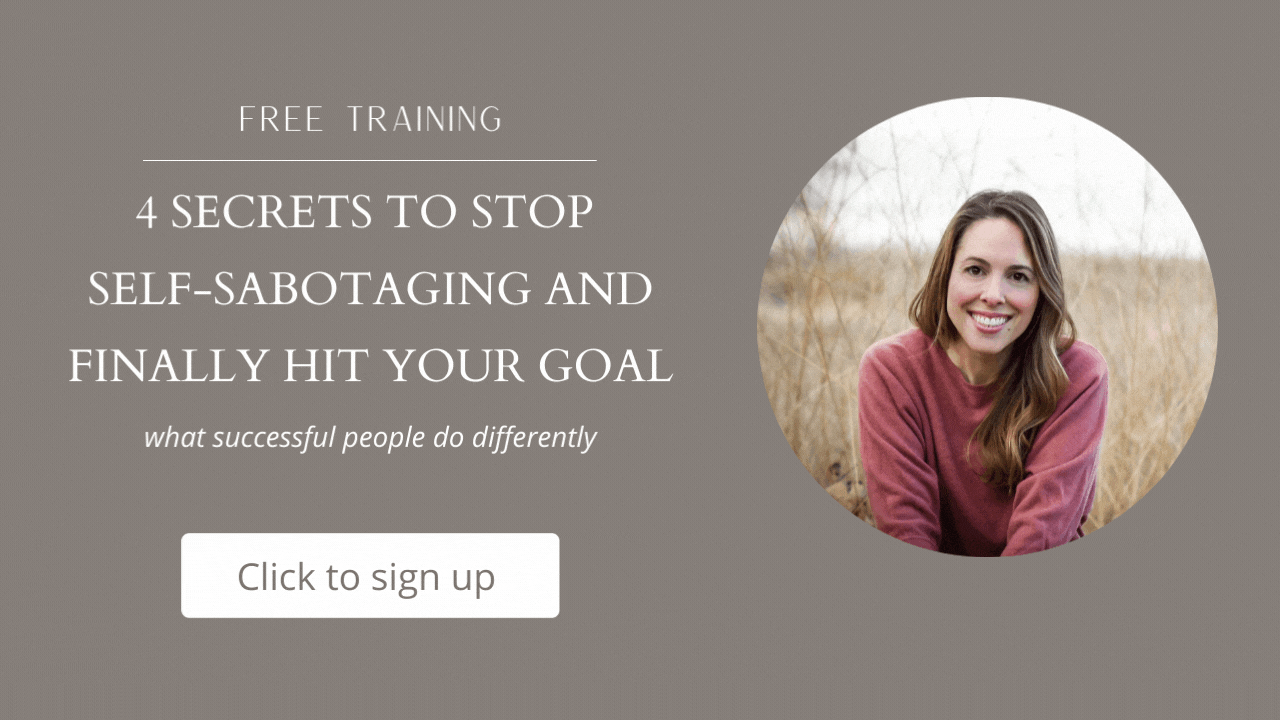How to stop worrying about everything: 6 tips to help you find calm
So you worry about the future (“What’s going to happen?”). You worry about the past (“Omg I said something weird. Does everyone hate me now?”). You worry about making the wrong decision (“What if I pick the wrong thing and regret it?”). You worry about…worrying (“Do I worry too much? Do I have an anxiety disorder???”)
Yipes. This is no way to live.
Listen - Some worrying is healthy and normal. But if worry is keeping you from making decisions or living the kind of life you want, then read on. I’m going to explain why you worry in the first place and give you tips to help you stop worrying and start living.
1 - Understand why you worry in the first place
You are genetically wired to worry and focus on the negative.
Our ancestors (the ones who lived and passed on their DNA) are the ones who survived. And they did that by paying extra attention to the shit that could kill them.
Lions den over there? Better avoid!
Glenn ate that weird plant and died? Better not hunter-gather that again!
Everyone kicked Cheryl out of the cave for being a pain in the butt and now she has to wander in the wilderness alone (probably getting eaten by those lions)? Better make sure everyone likes you!
Thanks to Great to the Thousandth Power Grandma and Grandpa Neanderthal who gave extra focus to potentially dangerous stuff (sure, those flowers are pretty but who cares when survival’s on the line?), we’re still here.
You’re designed to survive, focus on the negative, and look for anything that could remotely spell D-A-N-G-E-R.
And it doesn’t matter if it’s something “silly.” Your brain legit sucks at knowing how dangerous something is. So here’s a list of things you logically know won’t kill you (but feel like they might):
Sending an email
Going to a networking event
Changing jobs
Saying “no” to someone
Giving a presentation
Getting a message from you boss asking, “Can you meet?”
Speaking up
Posting anything other than cat videos on social media
No wonder you’re so worried! (pssst - We all are).
How can you stop worrying?
So now we know WHY you worry so much, what can you do about it?
The good news is - Even if you’re operating with some ancient biological software, you’ve got the ability to upgrade your settings. Keep reading for tips to help you stop worrying.
2- Recognize the difference between productive worry and unproductive worry
Not all worry is bad. In fact, worrying can help you anticipate and overcome potential problems. It can even help you get stuff done! That’s productive worry.
But unproductive worry just leaves you feeling powerless and spinning in anxiety.
When you know the difference you can respond accordingly. I’m a visual person, so I made a thing for you:
It might seem weird that the first item is to notice your worry. But you’d be surprised how often we’re just worrying away without any idea that we’re doing it.
Simply noticing that you’re experiencing stress and worry about a situation is a key step in being able to do something about it.
Once you notice you’re worried, you can get curious about it. Why are you worrying? What are you really afraid of?
Now, if you’re like me, you get to the part of “Let the worry go” and you kind of roll your eyes. I mean, isn’t that what you’ve been trying to do this whole time?
Don’t worry. I’ve got you.
I’m not just going to leave you with “Let it go, Elsa!” and call it a day.
Keep reading for actionable steps to help you release your worries or, at the very least, turn down the volume on them so they don’t keep you stuck and anxious.
3 - Learn to worry in a way that’s actually helpful
“Positive vibes only” triggers my upchuck response.
Because we all worry. Worrying is never the issue. It’s what we DO with that worry that matters.
And a lot of us try to squash it when it comes up. We argue with it. We practice positive thoughts and affirmations. And it usually doesn’t work.
Sometimes all worry needs is to be heard and comforted so we can release it.
Here are some ideas to help your brain if you want to stop worrying:
Write down all your thoughts. This is a little like taking out the trash. It gives your stress and worry some airtime (which is sometimes all it needs!) but it also helps you see your thoughts so you can be more objective
Look at the worst case scenario and then ask yourself - “What else could be true?” Come up with as many possibilities as you can.
Schedule worry time. Sit down for 5-10 minutes and worry. I’m talking REALLY WORRY. No comforting yourself or positive thinking. Make yourself go to the very worst case scenario. You’ll be surprised. This is harder than you think. And by the end of the time limit, you’ll be ready to think about something else.
This sounds goofy but talk to you worry like it’s a person. Ask it, “What do you need right now?” And then LISTEN.
You’ll notice I DIDN’T say “Think positive thoughts!” We need to give worry a voice, hear it out, and then move on.
4 - Give your brain a job to do
WORRY lives in the BRAIN.
ANXIETY lives in the BODY.
And the two of them are best friends - always texting, sharing inside jokes, and sending each other memes and TikTok’s about the apocalypse.
If your brain doesn’t have a job to do, it’s going to go right for the doomscrolling and worrying. Which is where you come in. Because you need to give them SOMETHING BETTER TO DO.
So we can give our brains other things to think about that provide comfort, without being like this guy:
So let’s give your brain a job by telling it what to think. Try these thoughts on like they’re clothes - which ones fit? which ones create less worry? which ones make you feel calm?
I always figure things out
Nothing has gone wrong
I can ask for help if I need it
I have plenty of time
I have everything I need to get through this
It’s okay to feel scared and I know I won’t feel this way forever
I’m resourceful
I can handle whatever happens
I’ve dealt with hard things in the past
I will be okay
5 - Move your body to feel less anxious
Worrying thoughts often create fear and anxiety in the body. So we can’t JUST think better thoughts and call it a day.
Feelings live in the body so you need to speak their language and do something physical. Here are some ideas of things you can do to help you feel more calm:
Take some deep breaths. There are a million techniques out there but it doesn’t have to be complicated. Just take 2 to 3 deep breaths. Inhale through your nose and exhale through your mouth. That’s it. If you want something more than that, I’m a fan of square breathing.
Move your body. It doesn’t matter what you do - just move. Go for a walk. Shake (yes, literally shake yourself all over). Jump up and down. Do some yoga or stretches. Dance. Get a massage. Movement moves the anxious energy through and out of your body.
Hug someone. It can be your dog, a friend, spouse, partner, child - anyone. If you don’t have someone to hug, you can also get a weighted blanket.
Do something pleasurable. Find an activity that helps you zone out and relax. Bonus point if it includes moving your hands (it’s science!) I personally love puzzles. But I know people who love to garden, knit, color, paint, or do pottery.
6 - Go to the worst case scenario mentally and play it through
Most of us do one of three things when we start to worry. We either:
Ruminate and replay the worst case scenario over and over
Try to ignore it and go do other things (but it’s constantly playing in the background or popping up in your head when you go to bed at night).
Numb it out with food, alcohol, shopping or all of the above
Argue with it and tell ourselves how stupid and silly we are. But then the worst case scenario brings in Exhibits A through Z about how NOT SILLY it is so now you feel worse.
None of these options work all that great.
So, here’s what I suggest instead:
Notice the worry and get curious about it.
Ask yourself, “What’s the worst case scenario?” and answer.
Then ask, “If that happens, then what?” and answer.
Keep going until you can’t go anymore.
What usually has us worried isn’t so much the worst case scenario, but the UNCERTAINTY of the future. By playing it through to the end, we help reduce that uncertainty and see that whatever happens - we’re usually going to be okay.
And the best is yet to come,
Erica
P.S. My clients create their most fulfilling careers and lives by learning to release the fear that keeps them playing small and stuck.
If you're ready to experience professional and personal growth that’s fueled by what you WANT (not what you fear), I currently have two spots available for private 1:1 coaching.
Click here to book a consultation for us to explore working together. We’ll talk about why you think you’re stuck, what you want, and how I can help you get there.
Was this helpful? You’ll probably also like…
Hi! I’m Erica
Wife to Brendan. Mom to twins + one. ADHDer. Slow runner. Coffee drinker. Swear words enthusiast.
I’m a licensed mental health therapist, former management consultant, and certified coach. I help busy professionals get out of their own way so they can achieve more with less stress.
What people are saying…
Let’s be friends! Follow me on Instagram
FREE TRAINING














